So you’re facing the dreaded “change” that you overheard your mother or grandmother talking about. The fact is, not many of us completely understand it. Menopause, or the cessation of monthly periods in women, comes in a few different stages. There is perimenopause, menopause, and post-menopause. This is the result of reproductive hormones declining over a period of years. The lowering of progesterone and estrogen brings on the “change” which is the end of a woman’s ability to get pregnant. While that usually isn’t a problem for most women, the symptoms can be very upsetting and uncomfortable.
Perimenopause can last from one to two years and up to ten years. Many women start to feel the mild symptoms in their mid-30’s or as late as 40’s and 50’s. On average, women feel night sweats, mood swings, irregular periods and hot flashes for around four years. There can also be perimenopause weight gain.A perimenopause diet can help relieve the symptoms women feel as these changes in the body begin to take place.
Perimenopause Diet: What to Eat
1. Soy
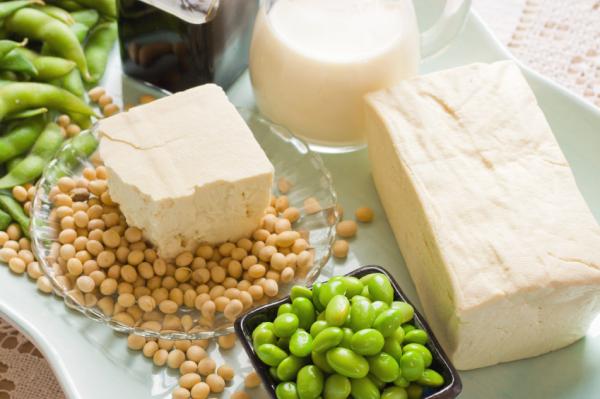 Soy (like tofu, soy nuts, and soy milk) can naturally relieve perimenopause symptoms because it contains plant based estrogen–“phytoestrogen”. Many doctors recommend soy first before prescribing estrogen supplements because it really does work. It has been found that Japanese women suffer from very few menopause symptoms because they eat high amounts of soy in their diets.
Soy (like tofu, soy nuts, and soy milk) can naturally relieve perimenopause symptoms because it contains plant based estrogen–“phytoestrogen”. Many doctors recommend soy first before prescribing estrogen supplements because it really does work. It has been found that Japanese women suffer from very few menopause symptoms because they eat high amounts of soy in their diets.
You may have heard of increased risk of breast cancer with soy use. Always check with your doctor first, but research studies show there is no scientific evidence to back these claims. As a matter of fact, women in Japan that eat a lot of soy in their diet tend to have lower incidence of breast cancer.
2. Calcium
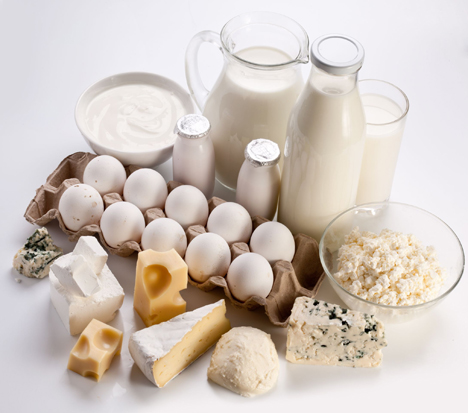 Every menopause diet needs to contain adequate amounts of calcium. After 50, women need at least 1,000 to 1,200 mg of calcium. This is because when estrogen goes down, so does the calcium in the bones. You can get more calcium in your diet by adding in just one cup of yogurt a day, a cup of low-fat milk and a latte for a whopping 1,100 mg of calcium. It really is that easy. If you can’t tolerate milk, ask your doctor about supplements.
Every menopause diet needs to contain adequate amounts of calcium. After 50, women need at least 1,000 to 1,200 mg of calcium. This is because when estrogen goes down, so does the calcium in the bones. You can get more calcium in your diet by adding in just one cup of yogurt a day, a cup of low-fat milk and a latte for a whopping 1,100 mg of calcium. It really is that easy. If you can’t tolerate milk, ask your doctor about supplements.
3. Omega 3 Foods
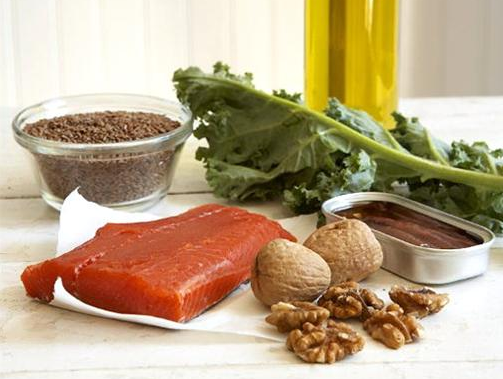 Omega 3 fatty acids are the building blocks of the brain cells. This essential nutrient helps stabilize your moods and may even help with depression. It can also help cardiac health, and improve memory. You can get your Omega 3 from two servings of wild caught cold water salmon, mackerel, bluefish and sardines every week. While fish is the highest source, you can also find Omega 3 in an ounce of walnuts, two tablespoons of ground flaxseed or one tablespoon of flax oil. There are quality Omega 3 supplements made from fish oil, but make sure you use one that has USP certification.
Omega 3 fatty acids are the building blocks of the brain cells. This essential nutrient helps stabilize your moods and may even help with depression. It can also help cardiac health, and improve memory. You can get your Omega 3 from two servings of wild caught cold water salmon, mackerel, bluefish and sardines every week. While fish is the highest source, you can also find Omega 3 in an ounce of walnuts, two tablespoons of ground flaxseed or one tablespoon of flax oil. There are quality Omega 3 supplements made from fish oil, but make sure you use one that has USP certification.
4. Legumes
 Legumes are anything in the bean family, lentils and peas. They are high in vitamin B6 that can help you metabolize estrogen better. Legumes are high in protein and fiber to keep blood sugar from spiking and crashing, which is a factor in mood swings. These are low in calories to help prevent weight gain. Try to eat one cup of beans or legumes like lentil soup, chili, pasta fagioli, or even use beans or lentils as a tasty side-dish.
Legumes are anything in the bean family, lentils and peas. They are high in vitamin B6 that can help you metabolize estrogen better. Legumes are high in protein and fiber to keep blood sugar from spiking and crashing, which is a factor in mood swings. These are low in calories to help prevent weight gain. Try to eat one cup of beans or legumes like lentil soup, chili, pasta fagioli, or even use beans or lentils as a tasty side-dish.
5. Whole Grain Foods
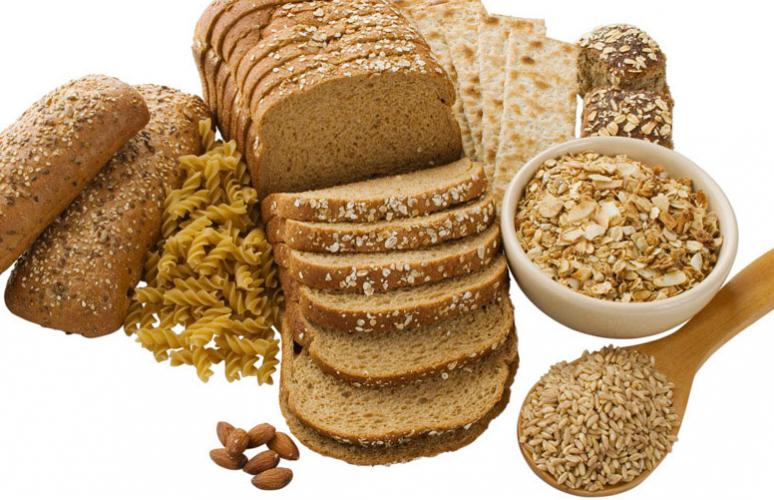 Get enough whole grains in your diet to give you even more vitamin B. This will help you combat stress, feel more energetic, and help digestion. Eat a hot bowl of steel-cut oatmeal for breakfast, quinoa as a side-dish, brown rice and even barley. Whole grains are also high in fiber and can help lower cholesterol levels and reduce the risk of heart disease later in life.
Get enough whole grains in your diet to give you even more vitamin B. This will help you combat stress, feel more energetic, and help digestion. Eat a hot bowl of steel-cut oatmeal for breakfast, quinoa as a side-dish, brown rice and even barley. Whole grains are also high in fiber and can help lower cholesterol levels and reduce the risk of heart disease later in life.
6. Complex Carbohydrates
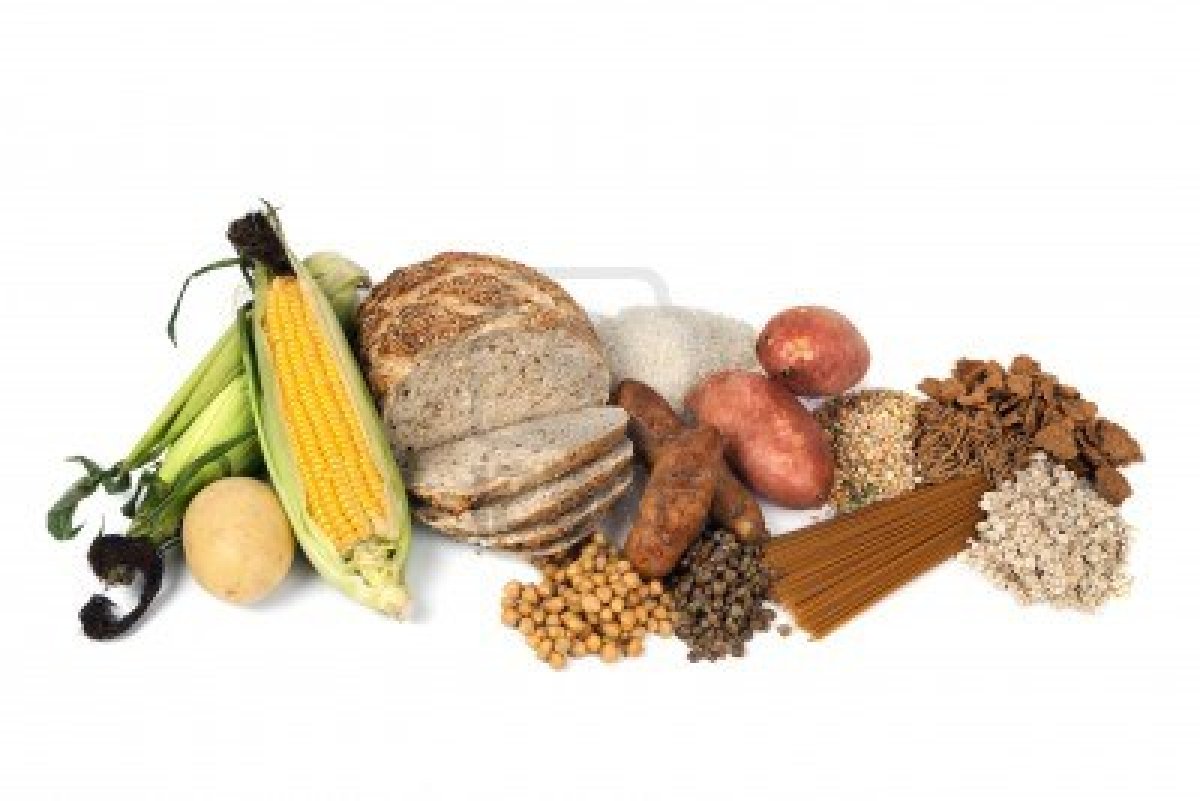 Complex carbohydrates take longer for the body to digest and can prevent unstable blood sugar levels and help make you feel full for longer periods of time. Complex carbohydrates are lower on the “glycemic index” meaning they don’t convert to glucose as quickly. Complex carbohydrates include brown rice, brown whole wheat pasta, whole wheat bread, potatoes that are high fiber like sweet potatoes and high fiber fruits (cherries).
Complex carbohydrates take longer for the body to digest and can prevent unstable blood sugar levels and help make you feel full for longer periods of time. Complex carbohydrates are lower on the “glycemic index” meaning they don’t convert to glucose as quickly. Complex carbohydrates include brown rice, brown whole wheat pasta, whole wheat bread, potatoes that are high fiber like sweet potatoes and high fiber fruits (cherries).
Note: Higher glycemic index carbohydrates can cause weight gain, fatigue and mood swings. They turn to glucose right away; examples are white bread, white rice, white flour pasta.
7. Fresh Fruits and Vegetables
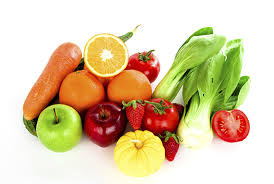 When you enter perimenopause, your metabolism slows down. This is due to a number of factors including being sedentary. You will notice more weight gain and constipation. An important part of any perimenopause diet is fresh fruits and vegetables. These are high in fiber and low in calories to help reduce weight gain and constipation.
When you enter perimenopause, your metabolism slows down. This is due to a number of factors including being sedentary. You will notice more weight gain and constipation. An important part of any perimenopause diet is fresh fruits and vegetables. These are high in fiber and low in calories to help reduce weight gain and constipation.
8. Recommended Superfoods
These foods are highly recommended for any perimenopause diet and any woman over 35:
- Almonds
- Avocado
- Beets
- Garlic
- Nuts and Seeds
- Olive Oil
- Oranges
- Pineapple
- Black or Green Tea
- Tomatoes
- Wild Caught Salmon
9. Herbal Supplements and Vitamins
The following are important supplements to help you regulate hormone levels:
- Evening Primrose Oil – Relieves menopause symptoms.
- Vitamin E – 400 IU of vitamin E daily may help with hot flashes.
- Dong Quai – This is a Chinese herb that helps regulate hormones, but does not act on estrogen. Use caution if you have excessive bleeding.
- Black Cohosh – Helps alleviate hot flashes.
10. Plenty of Water
Getting enough water can keep your body hydrated. This can reduce symptoms like vaginal dryness and itchy skin. It can also reduce bloating that occurs during perimenopause. Try to drink at least eight to ten glasses of water daily.
Perimenopause Diet: What to Avoid
Avoid Sugar, Alcohol and Caffeine. Take care of your body and avoid anything that aggravates symptoms of menopause. High blood sugar, caffeine jolts and hangovers from alcohol can all make menopause symptoms worse. Many women find that stopping these three things bring rapid improvement.
Reduce Sodium and Processed Foods. The combination of preservatives in processed foods and sodium can lead to one of the most common symptoms of menopause: bloating. To relieve bloating, eat more fresh foods and whole grains.
